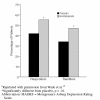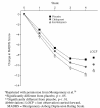Escitalopram: A New SSRI for the Treatment of Depression in Primary Care
- PMID: 15014711
- PMCID: PMC315490
- DOI: 10.4088/pcc.v04n0601
Escitalopram: A New SSRI for the Treatment of Depression in Primary Care
Abstract
Escitalopram is the S-enantiomer of the racemic compound citalopram, a selective serotonin reuptake inhibitor (SSRI) widely used for the treatment of depression. This review describes the current body of pharmacologic and clinical evidence supporting the use of escitalopram for the treatment of depression and anxiety. Preclinical studies have confirmed that it is primarily this molecule that provides the inhibition of serotonin reuptake responsible for the antidepressant effect of citalopram, with minimal-to-nonexistent affinity for other receptor sites. Clinical trials of escitalopram in depressed patients indicate that escitalopram, 10 mg/day, is as effective as 40 mg/day of its parent compound, citalopram, with an excellent safety and tolerability profile. Because of its increased selectivity, escitalopram represents a refinement in SSRI therapy for symptoms of depression and anxiety. This article also explores the implications of a more selective SSRI on the management of depressed patients in the primary care clinical practice.
Figures





References
-
- Owens MJ, Rosenbaum JF. Escitalopram: a second-generation SSRI. CNS Spectrums. 2002;7(suppl 1):34–39. - PubMed
-
- Owens MJ, Knight DL, Nemeroff CB. Second-generation SSRIs: human monoamine transporter binding profile of escitalopram and R-fluoxetine. Biol Psychiatry. 2001;50:345–350. - PubMed
-
- Hytell J, Bøgesø KP, Perregaard J, et. al. The pharmacological effect of citalopram resides in the (S)-(+)-enantiomer. J Neural Transm. 1992;88:157–160. - PubMed
-
- Sanchez C, Hogg S. The antidepressant effect of citalopram resides in the S-enantiomer (Lu 26-054) Biol Psychiatry. 2000;47:88S.
-
- Mork A, Kreilgaard M, Sanchez C, and et. al. Escitalopram: a comparative study of in vitro and in vivo 5-HT uptake inhibitory activity [poster]. Presented at the 23rd Congress of the Collegium Internationale Neuro-Psychopharmacologium; June 23–27, 2002; Montreal, Canada. P.1.E.054.
LinkOut - more resources
Full Text Sources
Medical
